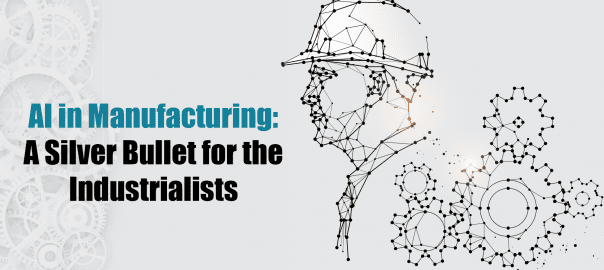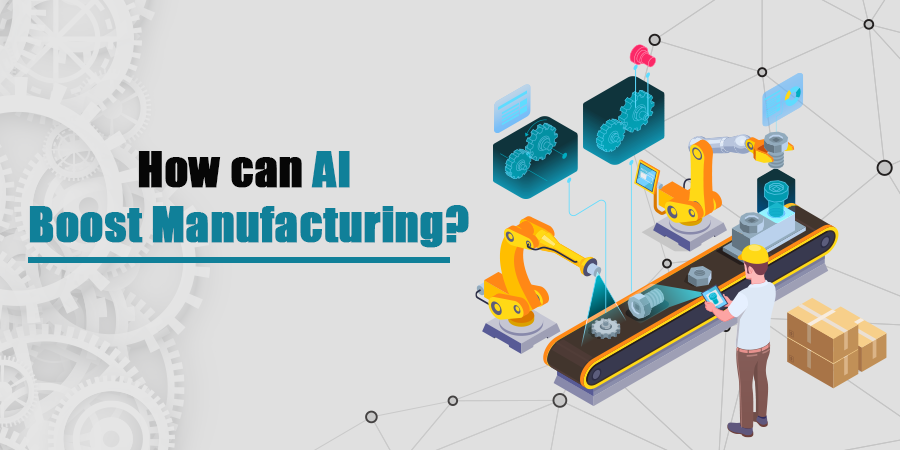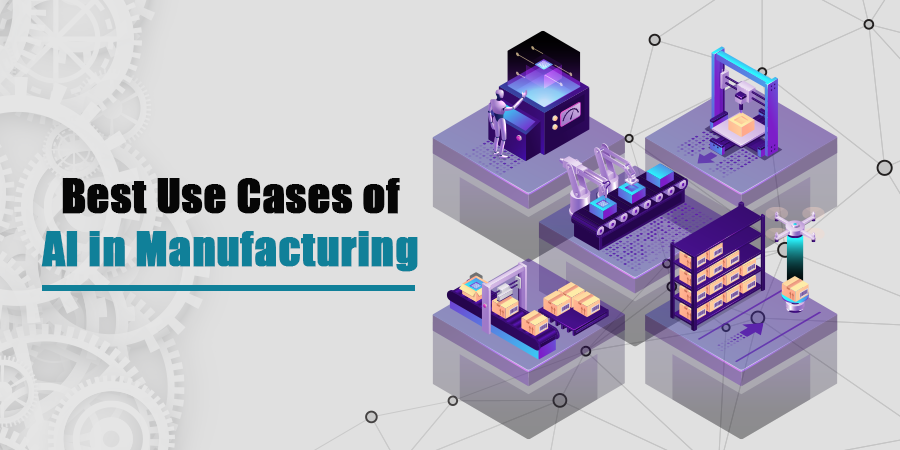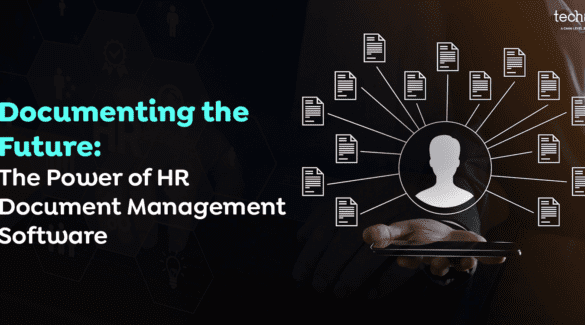14 Oct 2021
Updated on December 26th, 2022
AI In Manufacturing: A Silver Bullet For The Industrialists
Surbhi Bhatia

Artificial Intelligence and Manufacturing: What a tidal wave of innovation!
Are you a part of the industry? We are glad to be throwing light on a topic that is not majorly known or opinionated by the audience.
So, here we go!
Let’s not overlook the fact that the manufacturing industry faces challenges that are difficult to overcome. Be it higher demands, shortage of skilled labor, or breaking down of the equipment, the industry is demanding an exceptional evolution!
To overcome the hurdles of the industry, manufacturers must remain well-informed to proceed with effective decision-making. Undoubtedly, the sector generates data that must be analyzed.
Evidently, it is impossible to inspect the data in bulk, and here’s precisely when Artificial Intelligence comes into play!
Fortunately, businesses have started realizing the potential and the power of AI and have started leveraging the same to accelerate operations.
Did you know?
Markets are expecting the global AI in the manufacturing sector to skyrocket and hit $16.7 billion by the end of 2026.
Do you want to know more about why industrialists are incorporating AI into manufacturing and how it can benefit the industry? Then, continue reading this article to learn more!
BUT FIRST…
What is Artificial Intelligence?
For all those unfamiliar with AI, it is a tech concerned with building smart machines that automate the processes, eliminating the need for human interference.
NOW…
How can AI Boost Manufacturing?

1. Averts Equipment Outage
As per industrialists, the equipment is likely to break down more often due to their continuous use for manufacturing. Therefore, due to the inconvenience, the process may stop for a few hours while the equipment is being fixed. The issue is, while a lot is going on with the equipment, it wastes a lot of unnecessary time and reduces productivity.
Fortunately, AI-powered software in this situation can detect any kind of breakdown in advance before it can lead to damage.
2. Helps in Accomplishing Quality Standards
Artificial Intelligence plays a great deal in maintaining the quality of the products by monitoring items on the production line. Additionally, it can analyze defects and keep low-quality products from getting despatched.
3. Supports Human Employees
As mentioned earlier, AI leads to automation. Thus, employees can focus on more prioritized activities. Furthermore, AI assistants can take up customer service actions, freeing up a lot of time for the employees to focus on other advanced tasks.
Best Use Cases of AI in Manufacturing

1. Estimation of Demand and Raw Material Prices
Considering the demand of an item, AI monitors consumers’ behavioral patterns, preferences, location, etc., to determine the demand. It enables manufacturers to focus on increasing the production of a product that is likely to be sold more than the products that won’t create demand.
And how do manufacturers predict the same? Again, ARTIFICIAL INTELLIGENCE is the key!
On the other hand, AI is also efficient in informing the industrialists about raw material costs in advance. Therefore, manufacturers then focus on minimizing the expenses.
2. Boosts Predictive Maintenance
Equipment is to be diagnosed regularly to avoid any wear and tear that could lead to huge losses. Therefore, AI helps in predictive maintenance by analyzing the working history of the equipment.
How?
An equipment’s performance is monitored, and the data is collected related to when the machine will need to be serviced. Therefore, the machine is fixed whenever it is about to reach its saturation level as per past experiences.
3. Backs Up Generative Design
Generative Design is an arrangement that utilizes AI technology to imitate an engineer’s take on designing products or items. Engineers provide information on design parameters, cost, and more, after which manufacturers start the production process, delivering the products based on those parameters.
Furthermore, the produced products can be tested to make sure that it matches the quality-check requirements.
4. Audits Product Quality
As mentioned earlier, it is essential to make sure that the products match the quality-check standards. Undoubtedly, it will be a time-consuming process if human employees start going through each product to check its quality. Therefore, AI can efficiently perform the activity using numerous tools, including computer vision.
Once the quality-check process is completed, the flaws in the products can be improved if possible. Also, it is advised to regulate quality-check after each stage to detect the flaws, if any, at a primary level.
Human-Robot Collaboration in a Nutshell
Artificial Intelligence is an incredible technology that has been here for a few years now. Initially, the potential of the tech was unknown; however, now that it is highly contributing to each and every industry, businesses have started realizing its importance.
Gladly, AI is not just restricted to logistics anymore, but other industries are leveraging the same for efficient arrangements.
What is your take on integrating AI tech into your industry?
If that’s a green signal from your side, it’s time to give it a shot!
But how?
We understand that the concept might be new for you, but fortunately, professionals are well-versed with the same. So, connect with the experts for more insights on the improvement of your existing work mechanism. Not only this but shake hands with the best app development company to build an efficient product.
Have a great day and happy innovation!
Get in touch.
Write Us
sales@techugo.comOr fill this form















